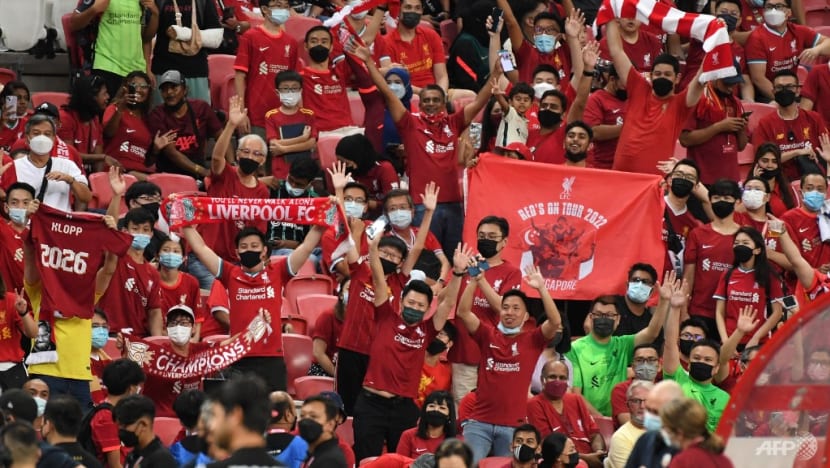Commentary: Liverpool going on sale highlights football’s financial fickleness
The storied club's owners need a sale after more than a decade of ownership has delivered paltry returns, says Bloomberg Opinion's Alex Webb.

Fans of Liverpool FC cheer as the team arrives on the pitch before the exhibition football match between English Premier League teams Crystal Palace FC and Liverpool FC at the National Stadium in Singapore on Jul 15, 2022. (Photo: AFP/Roslan Rahman)
LONDON: The mooted sale of Liverpool Football Club confirms an uncomfortable truth: No one really makes any money owning a soccer club, they only profit from selling it.
Fenway Sports Group Holdings, which also owns Major League Baseball’s Boston Red Sox and the National Hockey League’s Pittsburgh Penguins, is exploring a sale of the English team.
Liverpool could fetch more than US$5 billion, Bloomberg News reported, citing an analyst estimate. A deal of that size would represent an incredible return on the £300 million (US$345 million) that FSG paid back in 2010. But without a sale, Liverpool would be a pretty poor investment.
Liverpool is a better-run club than most, with tight controls of its costs. But in more than a decade of FSG’s ownership, the team has still only made a cumulative profit of £27 million, representing an annualised return of just 0.8 per cent — pitiful by almost any standards. Assuming the reinvestment of dividends, the S&P 500 has returned 13 per cent a year to investors over the same period.
So in order to generate anything resembling a meaningful return, you have to sell the team. That’s why they change hands with such regularity: Half the current teams in England’s top tier Premier League have different owners than they did a decade ago. Clubs are sold with the promise of better earnings tomorrow rather than on the basis of financial stability today.
Even the Glazer family, long the target of fan opprobrium during its ownership of Manchester United, has averaged cash returns of just 5 per cent a year since taking over in 2005. And more than half of that has come from selling shares.
EARNINGS LINKED TO ON-FIELD PERFORMANCE
That’s because earnings are so tightly linked to on-field performance, a point Liverpool demonstrates all too well. Its most profitable years under FSG were 2018 and 2019, when it reached the Champions League final in successive years – winning the second time around.
In the years since, albeit impaired by the COVID-19 pandemic, it has struggled to turn a profit and failed to invest as heavily in its squad. Partly as a consequence of that underinvestment, the team is struggling to perform this year, and appears well out of the title race and risks not qualifying for next year’s Champions League.
The short-lived European Super League would have eliminated that sort of boom and bust cycle by adopting a more American model. The same teams would have participated every year in the top pan-European competition, ensuring stable and predictable revenue.
There were also plans to introduce a salary cap to restrain ever-spiraling wage costs. It’s a change that appealed to the US owners of Liverpool, Manchester United and Arsenal. Now that idea is off the table, the prospect of stabilising earnings must have looked pretty bleak.
But then Todd Boehly and Clearlake ponied up £4.3 billion earlier this year to buy Chelsea FC. Suddenly the timing for a Liverpool sale looks propitious. Even as future earnings look more complicated than they did when the super league was still a realistic possibility, valuations have climbed into the stratosphere – Chelsea attracted six other bidders.
Between the push effect of the demise of the super league, and the pull effect of Chelsea’s swollen valuation, FSG chairman John Henry must surely reckon considering a sale makes sense.
There are those in the game that aren’t so financially motivated, such as the state-backed owners of Newcastle United FC, Manchester City FC and Paris-Saint Germain, whose governments benefit from the halo of owning an international team and are deemed to be "sportswashing" less-than-stellar human rights records at home.
For the rest, the problem is always going to be what happens next. Chelsea’s new owners are a private equity firm that will surely, at some stage, seek an exit too. While the current boom-bust structure persists, European football teams will be at the perennial mercy of owners seeking the next buyer.

















